A Policy Brief on Enhancing Labour Law Flexibility in Sri Lanka
VerifiedAdded on 2023/06/20
|6
|2125
|500
Report
AI Summary
This policy brief examines the need for more flexible labor laws in Sri Lanka, given the global trend towards reduced working hours and increased demand for work-life balance. It highlights that current Sri Lankan regulations do not accommodate flexible work arrangements such as part-time employment, remote work, or compressed workweeks, negatively impacting job creation. The brief discusses how existing laws, including the Shop and Office Employees Act and the Wages Boards Ordinance, hinder flexibility regarding working hours, leave entitlements, and minimum wage requirements. It proposes changes such as stakeholder collaboration, benefit recalculation based on working arrangements, and the adoption of prorating periods similar to the Indian model. The brief emphasizes the importance of adapting labor laws to accommodate the rise of remote work and the gig economy, referencing international guidelines from organizations like the ILO, and suggests creating a framework to manage the transition to flexible work models.
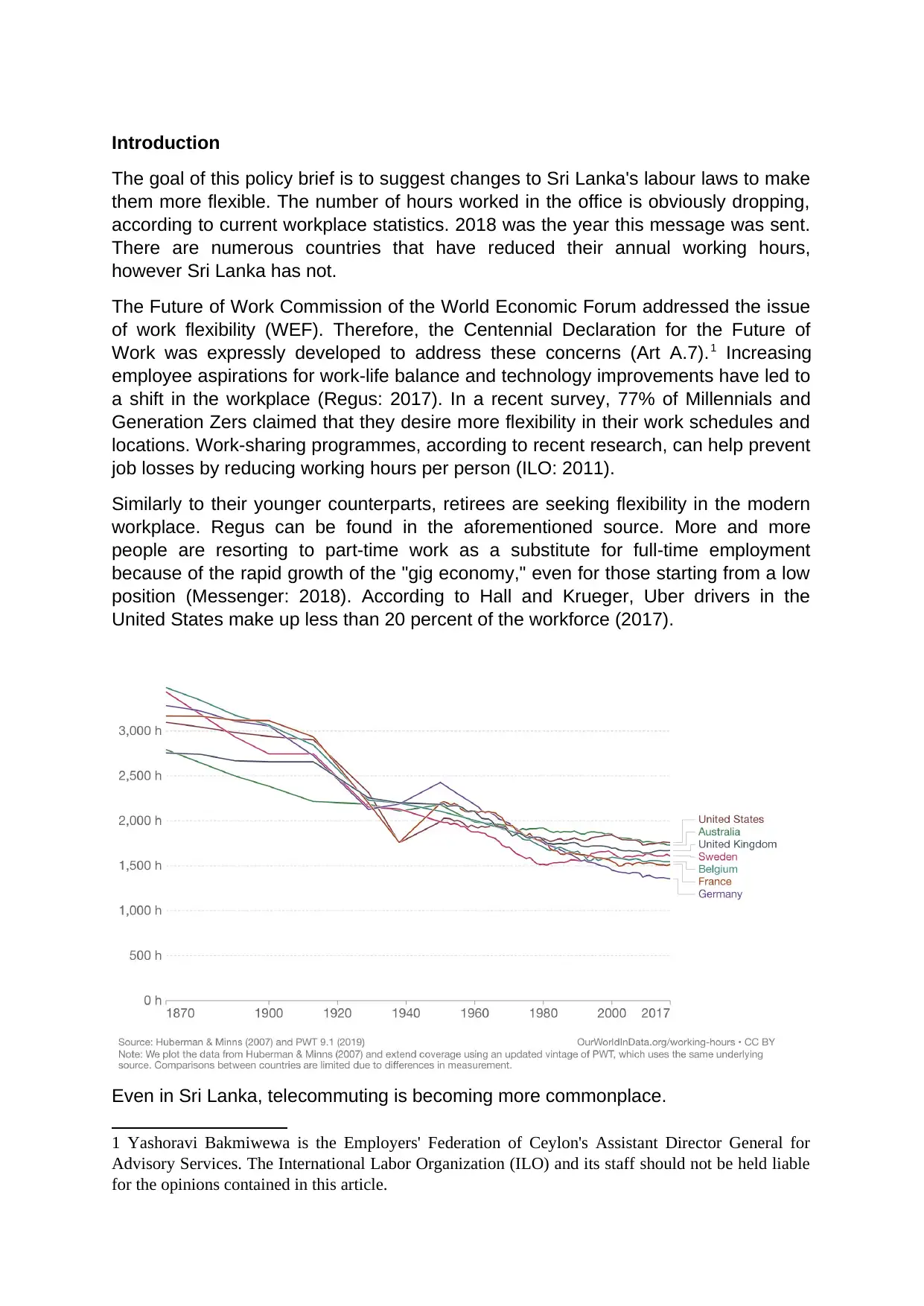
Introduction
The goal of this policy brief is to suggest changes to Sri Lanka's labour laws to make
them more flexible. The number of hours worked in the office is obviously dropping,
according to current workplace statistics. 2018 was the year this message was sent.
There are numerous countries that have reduced their annual working hours,
however Sri Lanka has not.
The Future of Work Commission of the World Economic Forum addressed the issue
of work flexibility (WEF). Therefore, the Centennial Declaration for the Future of
Work was expressly developed to address these concerns (Art A.7).1 Increasing
employee aspirations for work-life balance and technology improvements have led to
a shift in the workplace (Regus: 2017). In a recent survey, 77% of Millennials and
Generation Zers claimed that they desire more flexibility in their work schedules and
locations. Work-sharing programmes, according to recent research, can help prevent
job losses by reducing working hours per person (ILO: 2011).
Similarly to their younger counterparts, retirees are seeking flexibility in the modern
workplace. Regus can be found in the aforementioned source. More and more
people are resorting to part-time work as a substitute for full-time employment
because of the rapid growth of the "gig economy," even for those starting from a low
position (Messenger: 2018). According to Hall and Krueger, Uber drivers in the
United States make up less than 20 percent of the workforce (2017).
Even in Sri Lanka, telecommuting is becoming more commonplace.
1 Yashoravi Bakmiwewa is the Employers' Federation of Ceylon's Assistant Director General for
Advisory Services. The International Labor Organization (ILO) and its staff should not be held liable
for the opinions contained in this article.
The goal of this policy brief is to suggest changes to Sri Lanka's labour laws to make
them more flexible. The number of hours worked in the office is obviously dropping,
according to current workplace statistics. 2018 was the year this message was sent.
There are numerous countries that have reduced their annual working hours,
however Sri Lanka has not.
The Future of Work Commission of the World Economic Forum addressed the issue
of work flexibility (WEF). Therefore, the Centennial Declaration for the Future of
Work was expressly developed to address these concerns (Art A.7).1 Increasing
employee aspirations for work-life balance and technology improvements have led to
a shift in the workplace (Regus: 2017). In a recent survey, 77% of Millennials and
Generation Zers claimed that they desire more flexibility in their work schedules and
locations. Work-sharing programmes, according to recent research, can help prevent
job losses by reducing working hours per person (ILO: 2011).
Similarly to their younger counterparts, retirees are seeking flexibility in the modern
workplace. Regus can be found in the aforementioned source. More and more
people are resorting to part-time work as a substitute for full-time employment
because of the rapid growth of the "gig economy," even for those starting from a low
position (Messenger: 2018). According to Hall and Krueger, Uber drivers in the
United States make up less than 20 percent of the workforce (2017).
Even in Sri Lanka, telecommuting is becoming more commonplace.
1 Yashoravi Bakmiwewa is the Employers' Federation of Ceylon's Assistant Director General for
Advisory Services. The International Labor Organization (ILO) and its staff should not be held liable
for the opinions contained in this article.
Paraphrase This Document
Need a fresh take? Get an instant paraphrase of this document with our AI Paraphraser
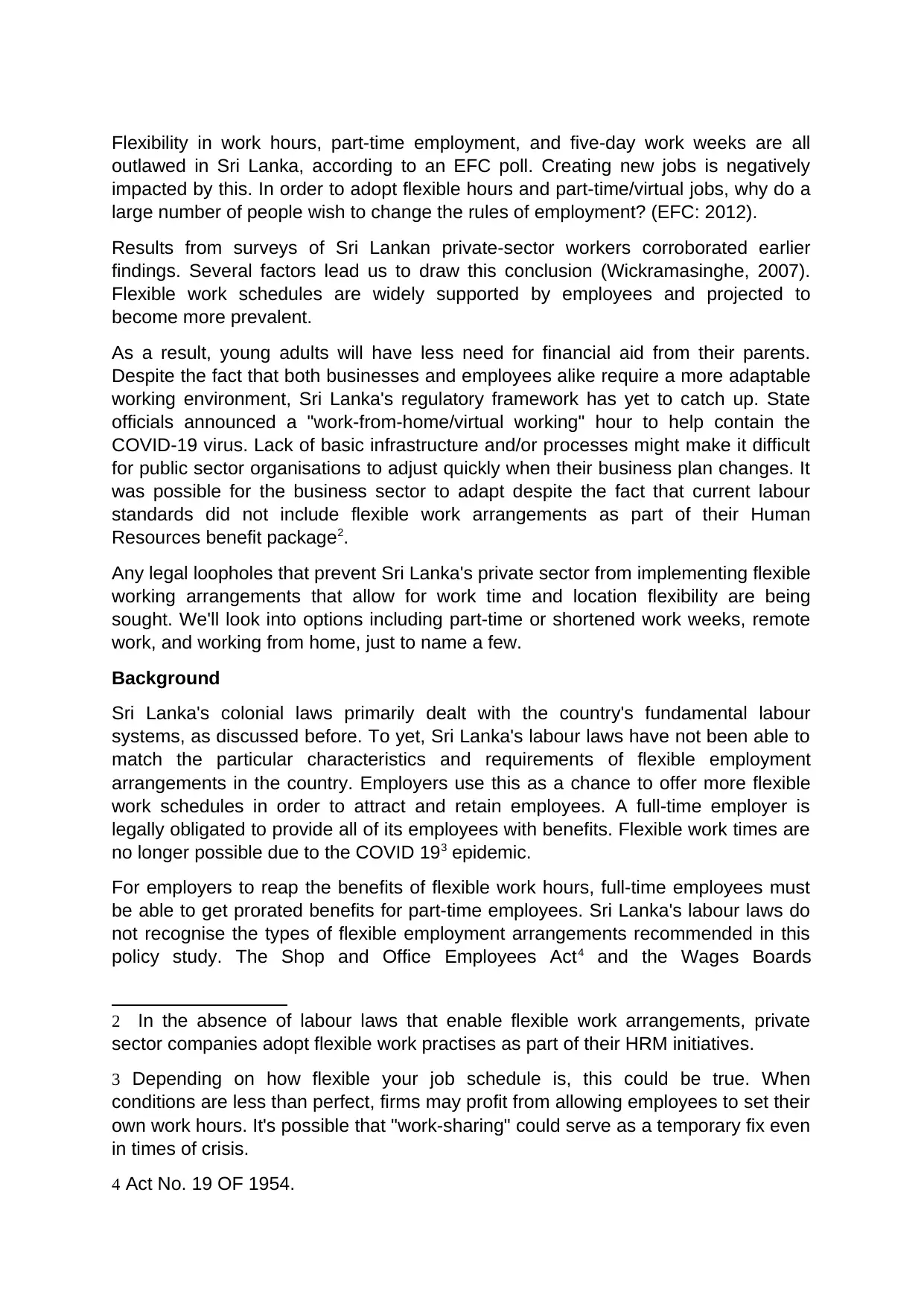
Flexibility in work hours, part-time employment, and five-day work weeks are all
outlawed in Sri Lanka, according to an EFC poll. Creating new jobs is negatively
impacted by this. In order to adopt flexible hours and part-time/virtual jobs, why do a
large number of people wish to change the rules of employment? (EFC: 2012).
Results from surveys of Sri Lankan private-sector workers corroborated earlier
findings. Several factors lead us to draw this conclusion (Wickramasinghe, 2007).
Flexible work schedules are widely supported by employees and projected to
become more prevalent.
As a result, young adults will have less need for financial aid from their parents.
Despite the fact that both businesses and employees alike require a more adaptable
working environment, Sri Lanka's regulatory framework has yet to catch up. State
officials announced a "work-from-home/virtual working" hour to help contain the
COVID-19 virus. Lack of basic infrastructure and/or processes might make it difficult
for public sector organisations to adjust quickly when their business plan changes. It
was possible for the business sector to adapt despite the fact that current labour
standards did not include flexible work arrangements as part of their Human
Resources benefit package2.
Any legal loopholes that prevent Sri Lanka's private sector from implementing flexible
working arrangements that allow for work time and location flexibility are being
sought. We'll look into options including part-time or shortened work weeks, remote
work, and working from home, just to name a few.
Background
Sri Lanka's colonial laws primarily dealt with the country's fundamental labour
systems, as discussed before. To yet, Sri Lanka's labour laws have not been able to
match the particular characteristics and requirements of flexible employment
arrangements in the country. Employers use this as a chance to offer more flexible
work schedules in order to attract and retain employees. A full-time employer is
legally obligated to provide all of its employees with benefits. Flexible work times are
no longer possible due to the COVID 193 epidemic.
For employers to reap the benefits of flexible work hours, full-time employees must
be able to get prorated benefits for part-time employees. Sri Lanka's labour laws do
not recognise the types of flexible employment arrangements recommended in this
policy study. The Shop and Office Employees Act4 and the Wages Boards
2 In the absence of labour laws that enable flexible work arrangements, private
sector companies adopt flexible work practises as part of their HRM initiatives.
3 Depending on how flexible your job schedule is, this could be true. When
conditions are less than perfect, firms may profit from allowing employees to set their
own work hours. It's possible that "work-sharing" could serve as a temporary fix even
in times of crisis.
4 Act No. 19 OF 1954.
outlawed in Sri Lanka, according to an EFC poll. Creating new jobs is negatively
impacted by this. In order to adopt flexible hours and part-time/virtual jobs, why do a
large number of people wish to change the rules of employment? (EFC: 2012).
Results from surveys of Sri Lankan private-sector workers corroborated earlier
findings. Several factors lead us to draw this conclusion (Wickramasinghe, 2007).
Flexible work schedules are widely supported by employees and projected to
become more prevalent.
As a result, young adults will have less need for financial aid from their parents.
Despite the fact that both businesses and employees alike require a more adaptable
working environment, Sri Lanka's regulatory framework has yet to catch up. State
officials announced a "work-from-home/virtual working" hour to help contain the
COVID-19 virus. Lack of basic infrastructure and/or processes might make it difficult
for public sector organisations to adjust quickly when their business plan changes. It
was possible for the business sector to adapt despite the fact that current labour
standards did not include flexible work arrangements as part of their Human
Resources benefit package2.
Any legal loopholes that prevent Sri Lanka's private sector from implementing flexible
working arrangements that allow for work time and location flexibility are being
sought. We'll look into options including part-time or shortened work weeks, remote
work, and working from home, just to name a few.
Background
Sri Lanka's colonial laws primarily dealt with the country's fundamental labour
systems, as discussed before. To yet, Sri Lanka's labour laws have not been able to
match the particular characteristics and requirements of flexible employment
arrangements in the country. Employers use this as a chance to offer more flexible
work schedules in order to attract and retain employees. A full-time employer is
legally obligated to provide all of its employees with benefits. Flexible work times are
no longer possible due to the COVID 193 epidemic.
For employers to reap the benefits of flexible work hours, full-time employees must
be able to get prorated benefits for part-time employees. Sri Lanka's labour laws do
not recognise the types of flexible employment arrangements recommended in this
policy study. The Shop and Office Employees Act4 and the Wages Boards
2 In the absence of labour laws that enable flexible work arrangements, private
sector companies adopt flexible work practises as part of their HRM initiatives.
3 Depending on how flexible your job schedule is, this could be true. When
conditions are less than perfect, firms may profit from allowing employees to set their
own work hours. It's possible that "work-sharing" could serve as a temporary fix even
in times of crisis.
4 Act No. 19 OF 1954.
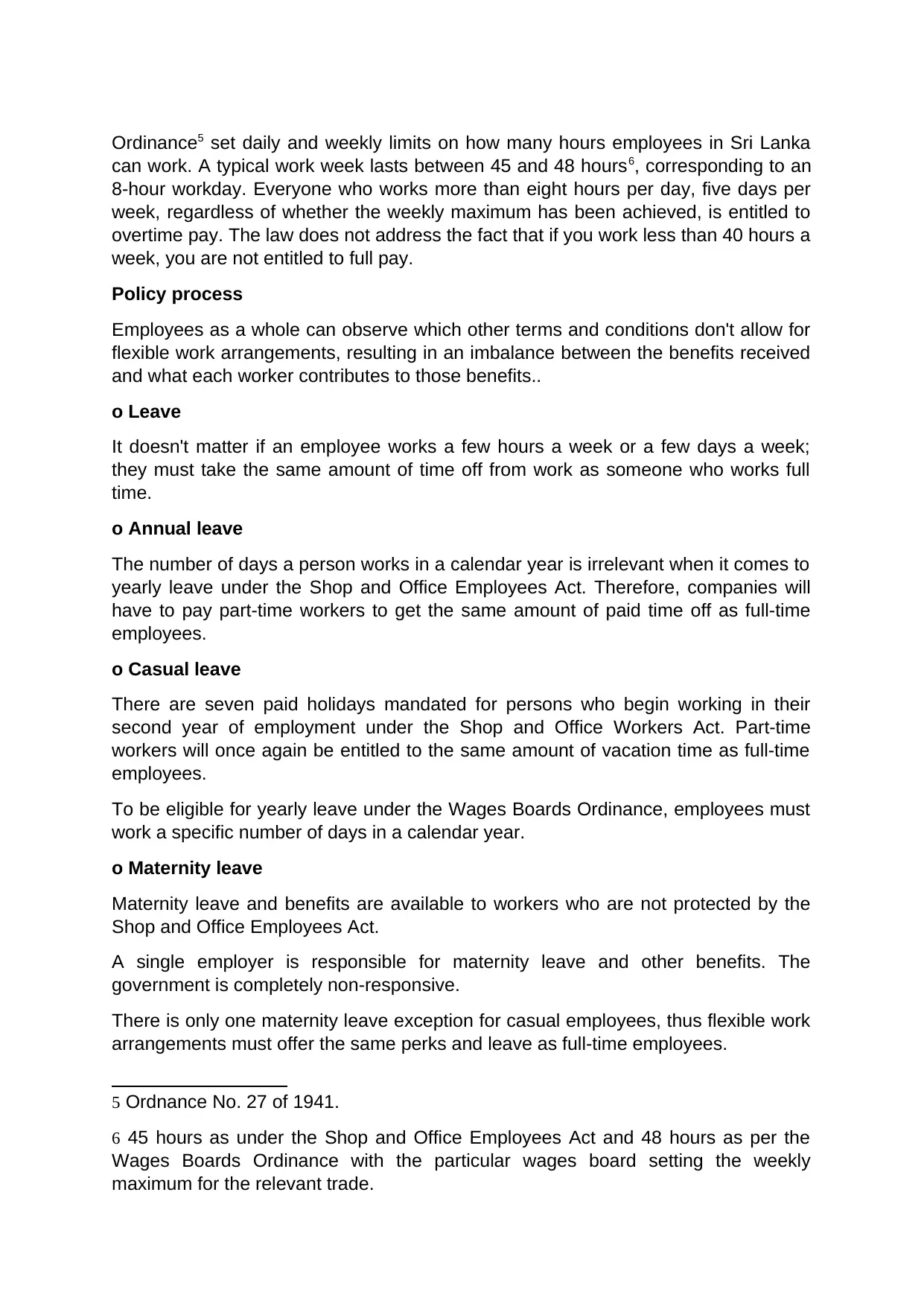
Ordinance5 set daily and weekly limits on how many hours employees in Sri Lanka
can work. A typical work week lasts between 45 and 48 hours6, corresponding to an
8-hour workday. Everyone who works more than eight hours per day, five days per
week, regardless of whether the weekly maximum has been achieved, is entitled to
overtime pay. The law does not address the fact that if you work less than 40 hours a
week, you are not entitled to full pay.
Policy process
Employees as a whole can observe which other terms and conditions don't allow for
flexible work arrangements, resulting in an imbalance between the benefits received
and what each worker contributes to those benefits..
o Leave
It doesn't matter if an employee works a few hours a week or a few days a week;
they must take the same amount of time off from work as someone who works full
time.
o Annual leave
The number of days a person works in a calendar year is irrelevant when it comes to
yearly leave under the Shop and Office Employees Act. Therefore, companies will
have to pay part-time workers to get the same amount of paid time off as full-time
employees.
o Casual leave
There are seven paid holidays mandated for persons who begin working in their
second year of employment under the Shop and Office Workers Act. Part-time
workers will once again be entitled to the same amount of vacation time as full-time
employees.
To be eligible for yearly leave under the Wages Boards Ordinance, employees must
work a specific number of days in a calendar year.
o Maternity leave
Maternity leave and benefits are available to workers who are not protected by the
Shop and Office Employees Act.
A single employer is responsible for maternity leave and other benefits. The
government is completely non-responsive.
There is only one maternity leave exception for casual employees, thus flexible work
arrangements must offer the same perks and leave as full-time employees.
5 Ordnance No. 27 of 1941.
6 45 hours as under the Shop and Office Employees Act and 48 hours as per the
Wages Boards Ordinance with the particular wages board setting the weekly
maximum for the relevant trade.
can work. A typical work week lasts between 45 and 48 hours6, corresponding to an
8-hour workday. Everyone who works more than eight hours per day, five days per
week, regardless of whether the weekly maximum has been achieved, is entitled to
overtime pay. The law does not address the fact that if you work less than 40 hours a
week, you are not entitled to full pay.
Policy process
Employees as a whole can observe which other terms and conditions don't allow for
flexible work arrangements, resulting in an imbalance between the benefits received
and what each worker contributes to those benefits..
o Leave
It doesn't matter if an employee works a few hours a week or a few days a week;
they must take the same amount of time off from work as someone who works full
time.
o Annual leave
The number of days a person works in a calendar year is irrelevant when it comes to
yearly leave under the Shop and Office Employees Act. Therefore, companies will
have to pay part-time workers to get the same amount of paid time off as full-time
employees.
o Casual leave
There are seven paid holidays mandated for persons who begin working in their
second year of employment under the Shop and Office Workers Act. Part-time
workers will once again be entitled to the same amount of vacation time as full-time
employees.
To be eligible for yearly leave under the Wages Boards Ordinance, employees must
work a specific number of days in a calendar year.
o Maternity leave
Maternity leave and benefits are available to workers who are not protected by the
Shop and Office Employees Act.
A single employer is responsible for maternity leave and other benefits. The
government is completely non-responsive.
There is only one maternity leave exception for casual employees, thus flexible work
arrangements must offer the same perks and leave as full-time employees.
5 Ordnance No. 27 of 1941.
6 45 hours as under the Shop and Office Employees Act and 48 hours as per the
Wages Boards Ordinance with the particular wages board setting the weekly
maximum for the relevant trade.
⊘ This is a preview!⊘
Do you want full access?
Subscribe today to unlock all pages.

Trusted by 1+ million students worldwide
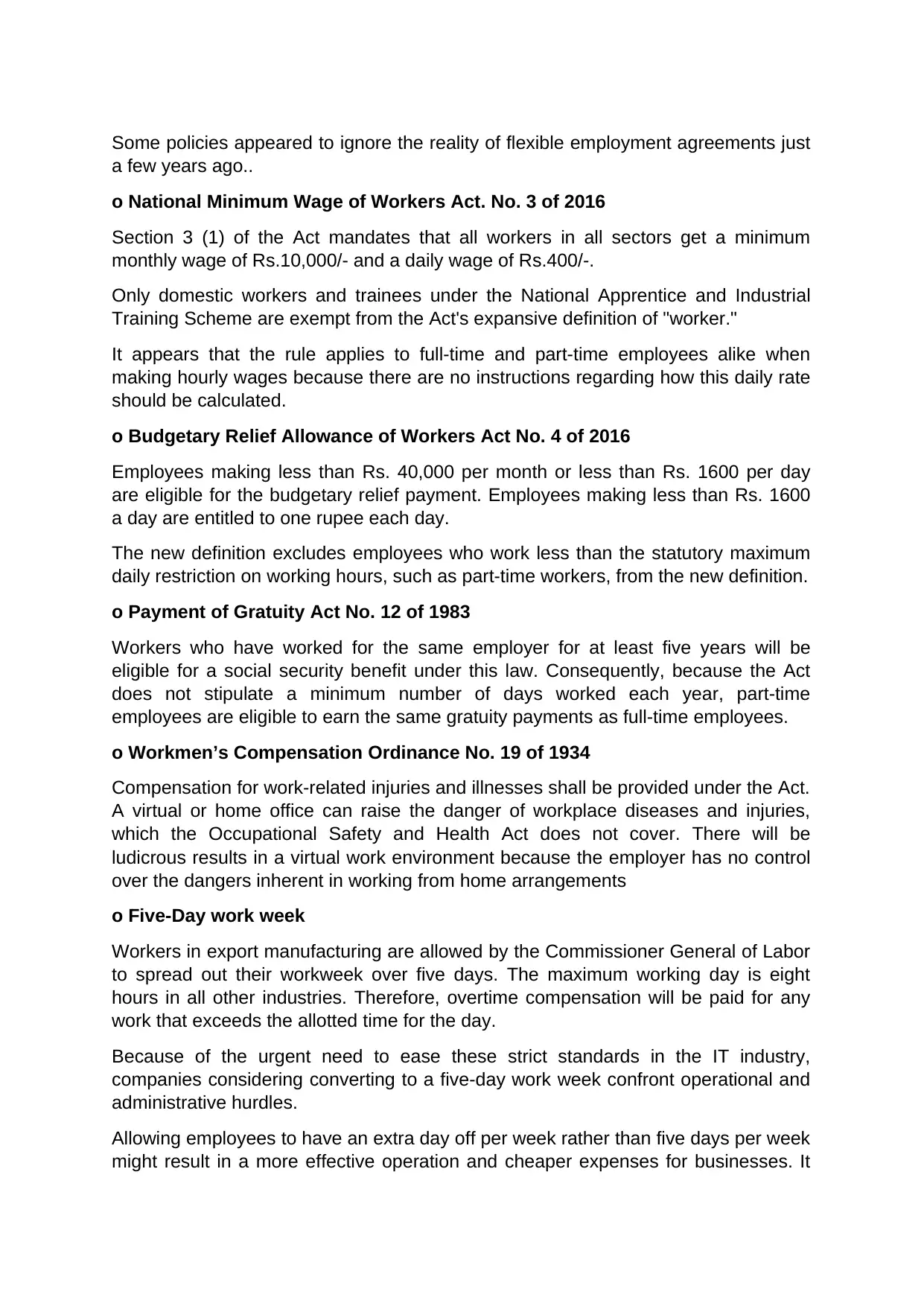
Some policies appeared to ignore the reality of flexible employment agreements just
a few years ago..
o National Minimum Wage of Workers Act. No. 3 of 2016
Section 3 (1) of the Act mandates that all workers in all sectors get a minimum
monthly wage of Rs.10,000/- and a daily wage of Rs.400/-.
Only domestic workers and trainees under the National Apprentice and Industrial
Training Scheme are exempt from the Act's expansive definition of "worker."
It appears that the rule applies to full-time and part-time employees alike when
making hourly wages because there are no instructions regarding how this daily rate
should be calculated.
o Budgetary Relief Allowance of Workers Act No. 4 of 2016
Employees making less than Rs. 40,000 per month or less than Rs. 1600 per day
are eligible for the budgetary relief payment. Employees making less than Rs. 1600
a day are entitled to one rupee each day.
The new definition excludes employees who work less than the statutory maximum
daily restriction on working hours, such as part-time workers, from the new definition.
o Payment of Gratuity Act No. 12 of 1983
Workers who have worked for the same employer for at least five years will be
eligible for a social security benefit under this law. Consequently, because the Act
does not stipulate a minimum number of days worked each year, part-time
employees are eligible to earn the same gratuity payments as full-time employees.
o Workmen’s Compensation Ordinance No. 19 of 1934
Compensation for work-related injuries and illnesses shall be provided under the Act.
A virtual or home office can raise the danger of workplace diseases and injuries,
which the Occupational Safety and Health Act does not cover. There will be
ludicrous results in a virtual work environment because the employer has no control
over the dangers inherent in working from home arrangements
o Five-Day work week
Workers in export manufacturing are allowed by the Commissioner General of Labor
to spread out their workweek over five days. The maximum working day is eight
hours in all other industries. Therefore, overtime compensation will be paid for any
work that exceeds the allotted time for the day.
Because of the urgent need to ease these strict standards in the IT industry,
companies considering converting to a five-day work week confront operational and
administrative hurdles.
Allowing employees to have an extra day off per week rather than five days per week
might result in a more effective operation and cheaper expenses for businesses. It
a few years ago..
o National Minimum Wage of Workers Act. No. 3 of 2016
Section 3 (1) of the Act mandates that all workers in all sectors get a minimum
monthly wage of Rs.10,000/- and a daily wage of Rs.400/-.
Only domestic workers and trainees under the National Apprentice and Industrial
Training Scheme are exempt from the Act's expansive definition of "worker."
It appears that the rule applies to full-time and part-time employees alike when
making hourly wages because there are no instructions regarding how this daily rate
should be calculated.
o Budgetary Relief Allowance of Workers Act No. 4 of 2016
Employees making less than Rs. 40,000 per month or less than Rs. 1600 per day
are eligible for the budgetary relief payment. Employees making less than Rs. 1600
a day are entitled to one rupee each day.
The new definition excludes employees who work less than the statutory maximum
daily restriction on working hours, such as part-time workers, from the new definition.
o Payment of Gratuity Act No. 12 of 1983
Workers who have worked for the same employer for at least five years will be
eligible for a social security benefit under this law. Consequently, because the Act
does not stipulate a minimum number of days worked each year, part-time
employees are eligible to earn the same gratuity payments as full-time employees.
o Workmen’s Compensation Ordinance No. 19 of 1934
Compensation for work-related injuries and illnesses shall be provided under the Act.
A virtual or home office can raise the danger of workplace diseases and injuries,
which the Occupational Safety and Health Act does not cover. There will be
ludicrous results in a virtual work environment because the employer has no control
over the dangers inherent in working from home arrangements
o Five-Day work week
Workers in export manufacturing are allowed by the Commissioner General of Labor
to spread out their workweek over five days. The maximum working day is eight
hours in all other industries. Therefore, overtime compensation will be paid for any
work that exceeds the allotted time for the day.
Because of the urgent need to ease these strict standards in the IT industry,
companies considering converting to a five-day work week confront operational and
administrative hurdles.
Allowing employees to have an extra day off per week rather than five days per week
might result in a more effective operation and cheaper expenses for businesses. It
Paraphrase This Document
Need a fresh take? Get an instant paraphrase of this document with our AI Paraphraser
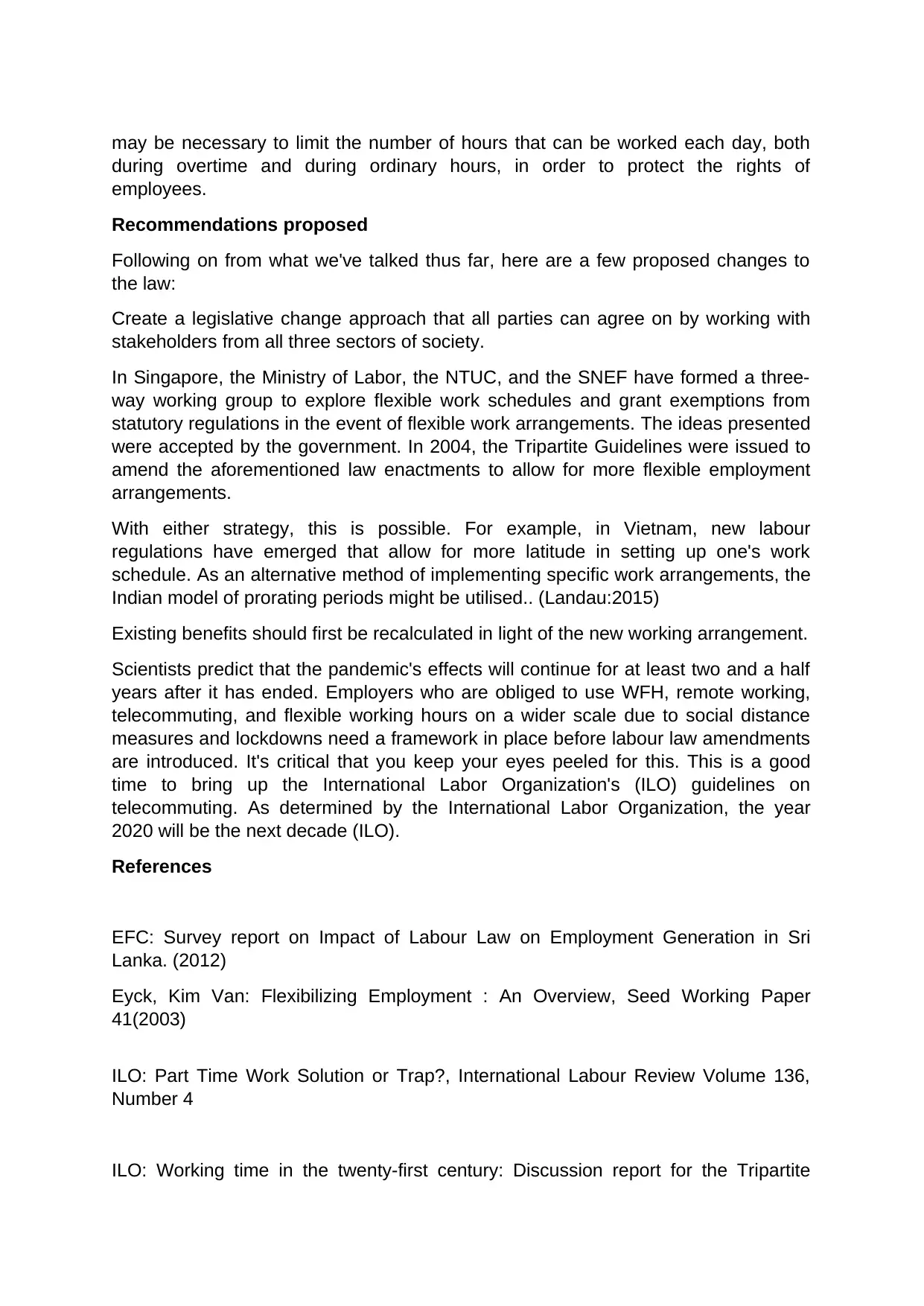
may be necessary to limit the number of hours that can be worked each day, both
during overtime and during ordinary hours, in order to protect the rights of
employees.
Recommendations proposed
Following on from what we've talked thus far, here are a few proposed changes to
the law:
Create a legislative change approach that all parties can agree on by working with
stakeholders from all three sectors of society.
In Singapore, the Ministry of Labor, the NTUC, and the SNEF have formed a three-
way working group to explore flexible work schedules and grant exemptions from
statutory regulations in the event of flexible work arrangements. The ideas presented
were accepted by the government. In 2004, the Tripartite Guidelines were issued to
amend the aforementioned law enactments to allow for more flexible employment
arrangements.
With either strategy, this is possible. For example, in Vietnam, new labour
regulations have emerged that allow for more latitude in setting up one's work
schedule. As an alternative method of implementing specific work arrangements, the
Indian model of prorating periods might be utilised.. (Landau:2015)
Existing benefits should first be recalculated in light of the new working arrangement.
Scientists predict that the pandemic's effects will continue for at least two and a half
years after it has ended. Employers who are obliged to use WFH, remote working,
telecommuting, and flexible working hours on a wider scale due to social distance
measures and lockdowns need a framework in place before labour law amendments
are introduced. It's critical that you keep your eyes peeled for this. This is a good
time to bring up the International Labor Organization's (ILO) guidelines on
telecommuting. As determined by the International Labor Organization, the year
2020 will be the next decade (ILO).
References
EFC: Survey report on Impact of Labour Law on Employment Generation in Sri
Lanka. (2012)
Eyck, Kim Van: Flexibilizing Employment : An Overview, Seed Working Paper
41(2003)
ILO: Part Time Work Solution or Trap?, International Labour Review Volume 136,
Number 4
ILO: Working time in the twenty-first century: Discussion report for the Tripartite
during overtime and during ordinary hours, in order to protect the rights of
employees.
Recommendations proposed
Following on from what we've talked thus far, here are a few proposed changes to
the law:
Create a legislative change approach that all parties can agree on by working with
stakeholders from all three sectors of society.
In Singapore, the Ministry of Labor, the NTUC, and the SNEF have formed a three-
way working group to explore flexible work schedules and grant exemptions from
statutory regulations in the event of flexible work arrangements. The ideas presented
were accepted by the government. In 2004, the Tripartite Guidelines were issued to
amend the aforementioned law enactments to allow for more flexible employment
arrangements.
With either strategy, this is possible. For example, in Vietnam, new labour
regulations have emerged that allow for more latitude in setting up one's work
schedule. As an alternative method of implementing specific work arrangements, the
Indian model of prorating periods might be utilised.. (Landau:2015)
Existing benefits should first be recalculated in light of the new working arrangement.
Scientists predict that the pandemic's effects will continue for at least two and a half
years after it has ended. Employers who are obliged to use WFH, remote working,
telecommuting, and flexible working hours on a wider scale due to social distance
measures and lockdowns need a framework in place before labour law amendments
are introduced. It's critical that you keep your eyes peeled for this. This is a good
time to bring up the International Labor Organization's (ILO) guidelines on
telecommuting. As determined by the International Labor Organization, the year
2020 will be the next decade (ILO).
References
EFC: Survey report on Impact of Labour Law on Employment Generation in Sri
Lanka. (2012)
Eyck, Kim Van: Flexibilizing Employment : An Overview, Seed Working Paper
41(2003)
ILO: Part Time Work Solution or Trap?, International Labour Review Volume 136,
Number 4
ILO: Working time in the twenty-first century: Discussion report for the Tripartite
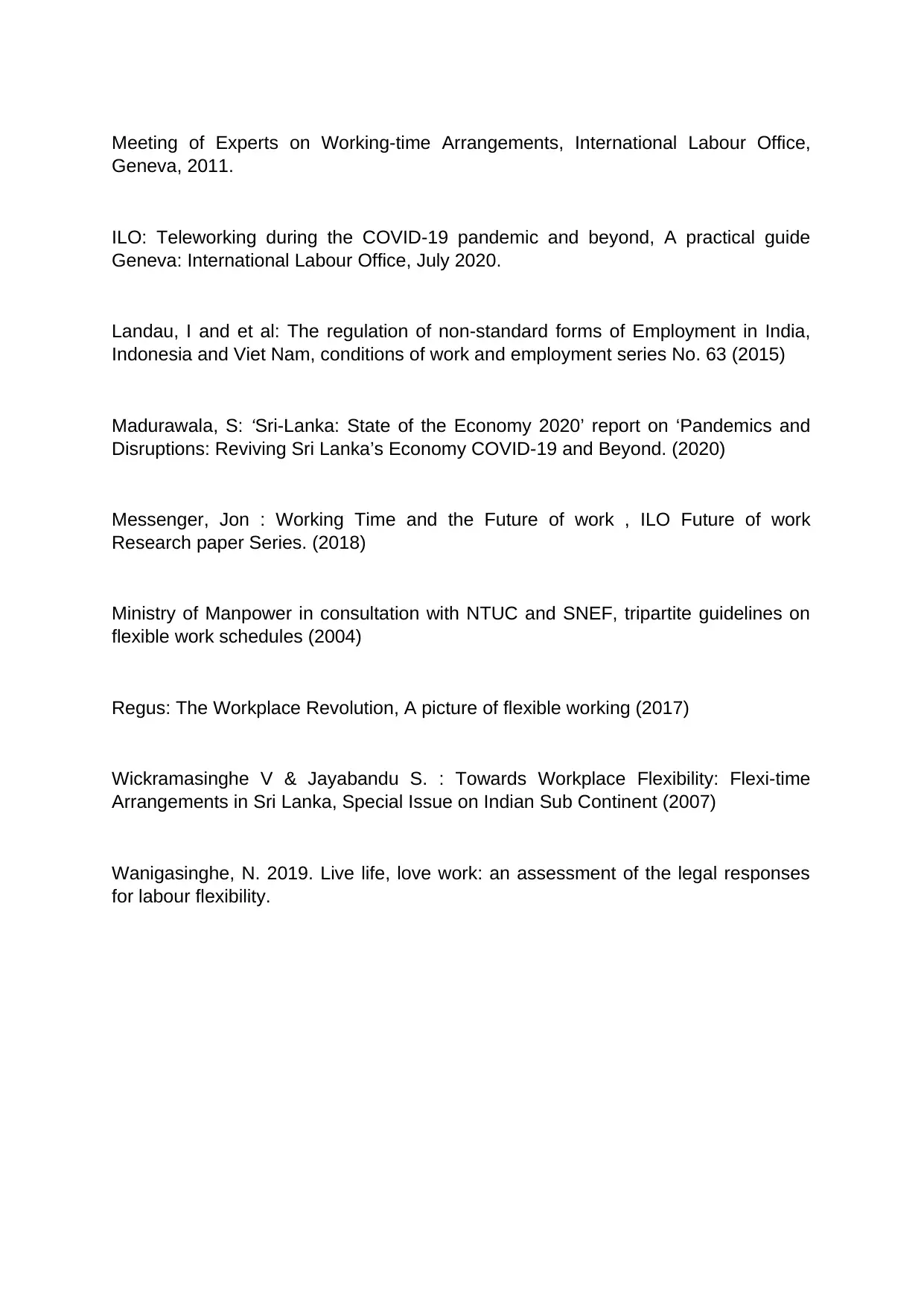
Meeting of Experts on Working-time Arrangements, International Labour Office,
Geneva, 2011.
ILO: Teleworking during the COVID-19 pandemic and beyond, A practical guide
Geneva: International Labour Office, July 2020.
Landau, I and et al: The regulation of non-standard forms of Employment in India,
Indonesia and Viet Nam, conditions of work and employment series No. 63 (2015)
Madurawala, S: ‘Sri-Lanka: State of the Economy 2020’ report on ‘Pandemics and
Disruptions: Reviving Sri Lanka’s Economy COVID-19 and Beyond. (2020)
Messenger, Jon : Working Time and the Future of work , ILO Future of work
Research paper Series. (2018)
Ministry of Manpower in consultation with NTUC and SNEF, tripartite guidelines on
flexible work schedules (2004)
Regus: The Workplace Revolution, A picture of flexible working (2017)
Wickramasinghe V & Jayabandu S. : Towards Workplace Flexibility: Flexi-time
Arrangements in Sri Lanka, Special Issue on Indian Sub Continent (2007)
Wanigasinghe, N. 2019. Live life, love work: an assessment of the legal responses
for labour flexibility.
Geneva, 2011.
ILO: Teleworking during the COVID-19 pandemic and beyond, A practical guide
Geneva: International Labour Office, July 2020.
Landau, I and et al: The regulation of non-standard forms of Employment in India,
Indonesia and Viet Nam, conditions of work and employment series No. 63 (2015)
Madurawala, S: ‘Sri-Lanka: State of the Economy 2020’ report on ‘Pandemics and
Disruptions: Reviving Sri Lanka’s Economy COVID-19 and Beyond. (2020)
Messenger, Jon : Working Time and the Future of work , ILO Future of work
Research paper Series. (2018)
Ministry of Manpower in consultation with NTUC and SNEF, tripartite guidelines on
flexible work schedules (2004)
Regus: The Workplace Revolution, A picture of flexible working (2017)
Wickramasinghe V & Jayabandu S. : Towards Workplace Flexibility: Flexi-time
Arrangements in Sri Lanka, Special Issue on Indian Sub Continent (2007)
Wanigasinghe, N. 2019. Live life, love work: an assessment of the legal responses
for labour flexibility.
⊘ This is a preview!⊘
Do you want full access?
Subscribe today to unlock all pages.

Trusted by 1+ million students worldwide
1 out of 6
Related Documents
Your All-in-One AI-Powered Toolkit for Academic Success.
+13062052269
info@desklib.com
Available 24*7 on WhatsApp / Email
![[object Object]](/_next/static/media/star-bottom.7253800d.svg)
Unlock your academic potential
Copyright © 2020–2026 A2Z Services. All Rights Reserved. Developed and managed by ZUCOL.





